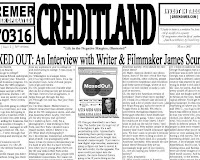 It's a weird kind of fortune that greets Tobin Brogunier's new publication, Creditland. A free tabloid distributed in the Twin Cities and Brooklyn, N.Y., its launch coincides with a spike in awareness of credit debt brought on by a meltdown in the subprime lending market and the premiere of the award-winning documentary film Maxed Out by James Scurlock (showing, until recently, at the Lagoon Cinema in Minneapolis). But the publication's origins have little to do with such luck.
It's a weird kind of fortune that greets Tobin Brogunier's new publication, Creditland. A free tabloid distributed in the Twin Cities and Brooklyn, N.Y., its launch coincides with a spike in awareness of credit debt brought on by a meltdown in the subprime lending market and the premiere of the award-winning documentary film Maxed Out by James Scurlock (showing, until recently, at the Lagoon Cinema in Minneapolis). But the publication's origins have little to do with such luck.A Minneapolis-based documentary photographer, Brogunier was living in Brooklyn five years ago when, saddled by five-digits worth of business-related credit card debt, he filed for bankruptcy. As he worked to rebuild his financial life, he pondered the psychology of lenders who kept extending him credit, even as his ability to pay diminished. Creditland, a chronicle of the practices and effects of America's credit-card companies, is the repository of some of his findings.
The inaugural issue, which hit the streets March 30, includes transcripts of personal stories about debt, a glossary of economic terms used by lenders and short fiction. The design of the four-page publication, like the theme it addresses, seems maxed out: Text is everywhere, jammed to the margins, with little breathing room offered via white space. Brogunier said the design matches the economy of the subject: "Paper is valuable." But much of the content is rich, especially the cover story, an interview Brogunier conducted with "Maxed Out" director Scurlock. (Full disclosure: I first met Brogunier at a February forum on predatory lending, and my recording of the event is the basis for the transcript of state Rep. Jim Davnie's talk at that event, which appears in Creditland).
The next issue will focus on the rebuilding of New Orleans and the struggles of African-American homeowners in the hurricane-struck region. He also hopes to begin collecting first-person narratives on debt (and welcomes "Debtor of the Month" columnists) and verbatim transcripts of phone calls with representatives from credit-card companies.
Brogunier hopes the publication will reach people affected by credit-card debt -- whether they are the visible urban poor or the seemingly well-to-do but secretly over-extended borrowers in wealthier suburbs -- and demonstrate the shared effects of the "mindless consumption binge" he says America has been on for 25 years.
"Some people do well in that system," he said. "They make enough money that they can buy things and it works and the global economy keeps going, and that’s great. Other people aspire to do that, and if they’re aspiring to do that and they don’t have the cash, credit cards come in as a stopgap measure. In an ownership society — as George Bush calls it — you end up being compelled to keep up with the Joneses, and what you end up owning is a lot of debt."
The social critique embedded in Creditland is aimed as much at the U.S. government as at the opportunistic credit-card companies, Brogunier said. "Debt I consider to be America’s version of a social safety net," he said. "We don’t cover health care, we don’t cover child care, so when the expenses get to be too much, it’s credit debt that comes in. It’s like a government subsidy, except it’s not the government, it’s privatized."
But while Creditland has built-in criticism, he emphasized that the publication's title shouldn't be read as an indictment of America, but instead as a call to ethics, which he defines as "doing the right thing."
"I have no problem with America. America is a very enterprising place. If you have an idea, America is the place to produce it," he said. "This country is extremely rewarding of ideas that work, and I want this to be an idea that works. This is an American magazine that way."
You could say Creditland is un-American in another way, though: while Americans are reaching record debt levels -- in 2006, we owed $12.8 trillion in mortgage and consumer loans (135% of disposable income) -- Brogunier says he won't use credit to keep the ad-supported magazine going.
Practicing what he preaches, he doesn't even own a credit card.
1 comment:
When someone is dealing with money troubles it is easy to lose control and end up creating more debt while trying to pay off existing debt! If someone finds themselves in a situation where they are living outside their means they should get some advice from professionals who can help them with their problems and assist in implementing a debt consolidation programme.
Post a Comment